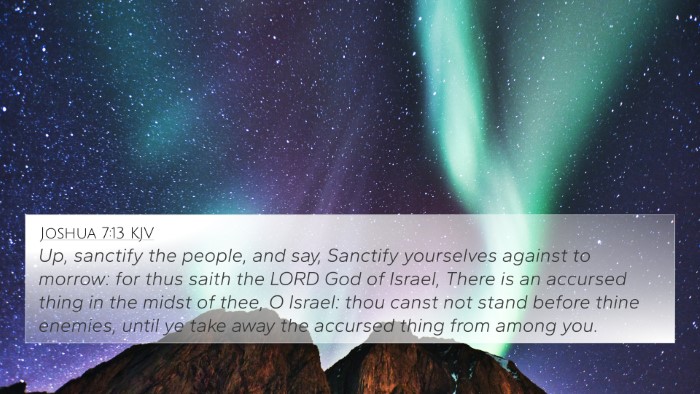Understanding 1 Samuel 9:26
1 Samuel 9:26 describes a pivotal moment in the narrative of the Old Testament where Saul and Samuel are at the threshold of a significant transition. The verse reads:
"And they arose early: and it came to pass about the spring of the day, that Samuel called Saul to the top of the house, saying,
'Up, that I may send thee away.' And Saul arose, and they went out both of them, he and Samuel, abroad."
Summary of the Verse
This verse encapsulates the moment when Samuel, the prophet, begins a formal process of sending Saul away after their encounter. It signifies an important turning point
in Saul's life as he is about to be anointed as the king of Israel. The act of rising early is often associated with important spiritual awakenings in the Bible,
suggesting a divine urgency in their mission.
Interpretations from Public Domain Commentaries
Matthew Henry's Commentary
Matthew Henry notes that this verse demonstrates the careful preparations made for Saul's future as the king. The early rising indicates a
readiness to fulfill God's will. It emphasizes the seriousness of the appointment that is about to take place, as well as Samuel's dedication
to his prophetic duties.
Albert Barnes' Notes
According to Albert Barnes, the action of sending away signifies the completion of a divine task. He highlights that Samuel's leading of Saul
to the top of the house symbolizes a higher calling—a transition from the ordinary to the extraordinary. Barnes also views this as a
foreshadowing of Saul's eventual detailed instructions and preparation for his leadership role.
Adam Clarke's Commentary
Adam Clarke describes the significance of the setting—the top of the house—as representing a place of divine encounter and communication.
He reflects on how this moment is key to the unfolding narrative of salvation history, where Saul’s role shifts fundamentally. It also signifies
a moment of obedience for Saul as he responds to Samuel’s call.
Bible Verse Cross-References
- 1 Samuel 10:1: "Then Samuel took a vial of oil, and poured it upon his head, and kissed him, and said, Is it not because
the LORD hath anointed thee to be captain over his inheritance?" This verse follows the anointing and demonstrates Saul's divine appointment.
- 1 Samuel 16:1: "And the LORD said unto Samuel, How long wilt thou mourn for Saul, seeing I have rejected him from reigning
over Israel? Fill thine horn with oil, and go, I will send thee to Jesse the Bethlehemite; for I have provided me a king among his sons."
Here, the process of appointing leaders is emphasized.
- 1 Samuel 9:20: "And as for thine asses that were lost three days ago, set not thy mind on them; for they are found.
And on whom is all the desire of Israel? Is it not on thee, and on all thy father's house?" This verse contains prophetic elements that identify the
significance of Saul.
- 1 Samuel 12:13: "Now therefore behold the king whom ye have chosen, and whom ye have desired! And, behold, the LORD
hath set a king over you." This reinforces the importance of the people's choice and God’s involvement in the kingship.
- Deuteronomy 17:15: "Thou shalt in any wise set him king over thee whom the LORD thy God shall choose: one from among
thy brethren shalt thou set king over thee: thou mayest not set a stranger over thee, which is not thy brother." This lays out the principles
of legitimate kingship in Israel.
- Proverbs 21:1: "The king's heart is in the hand of the LORD, as the rivers of water: he turneth it whithersoever he will."
This demonstrates God's control over the authority established in Israel.
- Romans 13:1: "Let every soul be subject unto the higher powers. For there is no power but of God: the powers that be are
ordained of God." This verse connects the idea of authority with divine ordination, similar to the anointing of kings in Israel.
Thematic Bible Verse Connections
The themes surrounding 1 Samuel 9:26 echo broader Biblical themes:
- Divine Election: Saul's calling points to God's choice in leadership.
- Preparation for Service: Samuel's early call suggests a preparation stage for fulfilling God’s will.
- Transformation: The transition from Saul as a mere servant to becoming king embodies a powerful transformation.
- Obedience: Saul's willingness to heed Samuel's call is a testimony to the importance of obedience in spiritual journeys.
- Covenant Community: The act of anointing signifies the relational aspect of God’s covenant with Israel.
Conclusion
1 Samuel 9:26 is rich with theological implications and sets the stage for the rise of Saul as king in Israel.
By examining this verse alongside related scriptures, one gains insights into the principles of leadership, divine appointment,
and the responsibilities that come with authority. The interplay between the characters of Samuel and Saul mirrors the
ongoing dialogues within scripture regarding God’s sovereignty, human choice, and the unfolding of His redemptive plan.
This analysis showcases the profound depth of the Biblical narrative, inviting readers to explore further through tools for
cross-referencing and comparative study methods.
Further Study Considerations
For those interested in broader cross-referencing Bible study, consider utilizing resources such as a Bible concordance or
a Bible cross-reference guide. Engaging with these tools will enhance understanding of the intricate connections
and themes woven throughout scripture, establishing a holistic view of biblical principles and historical contexts.






